On Wednesday, Iran executed a man identified as a spy for Israel’s Mossad, linked to the assassination of a Revolutionary Guard colonel in Tehran in 2022. The execution of Mohsen Langarneshin has sparked significant concerns regarding human rights and the judicial process in the Islamic Republic. Reports indicate that Langarneshin’s confessions were obtained under duress, raising questions about the validity of his trial and broader implications for espionage in the region.
| Article Subheadings |
|---|
| 1) Assassination of Col. Hassan Sayyad Khodaei |
| 2) Allegations Against Mohsen Langarneshin |
| 3) Details of the Judicial Process |
| 4) Human Rights Concerns and Family Statements |
| 5) Implications for Iran-Israel Relations |
Assassination of Col. Hassan Sayyad Khodaei
On May 22, 2022, Colonel Hassan Sayyad Khodaei was killed in an ambush near his home in Tehran, an event that sent shockwaves throughout Iran. Two assailants on a motorcycle approached him and opened fire, resulting in multiple gunshot wounds. This incident was described in the media as a significant blow to Iran’s security apparatus, as Khodaei was considered a prominent figure within the Revolutionary Guard, particularly within its elite Quds Force.
In the aftermath of the assassination, Iranian authorities accused Israel of orchestrating the operation due to Khodaei’s involvement in operations against ISIS in Syria and Iraq, where he earned recognition for his efforts in the conflict. The term “defender of the shrine” was frequently used in state media to refer to him, emphasizing his role in not just military operations but also in religious and ideological campaigns against perceived threats to the Islamic Republic.
Allegations Against Mohsen Langarneshin
The Iranian state media identified Mohsen Langarneshin as a significant actor in Khodaei’s assassination, claiming he provided crucial “technical support” to the assailants. Reports suggest that Langarneshin, a former politician, was recruited by the Mossad in 2020, marking the beginning of a two-year relationship where he allegedly collaborated on various missions against Iranian targets.
Langarneshin was accused of not only facilitating the assassination but also possessing connections to a wider network of operations within Iran, including providing logistical support for attacks against industrial centers linked to the Iranian defense ministry. He allegedly purchased vehicles and equipment that aided Mossad operations, rented safe houses, and transferred funds between Mossad officers and local contacts.
Details of the Judicial Process
Following his arrest, Langarneshin was put on trial in Iran’s Revolutionary Court, which is notorious for its closed-door proceedings. Reports indicate that he confessed at various stages of the trial, raising alarms over the validity of these admissions. According to press releases, he faced prolonged interrogations where it was alleged that some confessions were coerced.
The Revolutionary Court has a history of dispensing harsh sentences against individuals accused of political and espionage-related crimes, often without the opportunity for adequate legal representation. Langarneshin was sentenced to death after a process characterized by a lack of transparency, fueling concerns from human rights organizations regarding the fairness of his trial.
Human Rights Concerns and Family Statements
Following the announcement of the execution, the Human Rights Activists News Agency raised serious issues regarding the conditions under which Langarneshin’s confessions were extracted. It was reported that his family had claimed that he was coerced into making false admissions through relentless pressure from interrogators. A source close to his family alleged that he had been promised a lighter sentence if he complied.
In the days leading up to his execution, Langarneshin’s father, Masoud Langarneshin, publicly criticized the Iranian judicial system, asserting that his son did not receive a fair trial. His mother echoed these sentiments, appealing for international support in efforts to save his life. The family’s anguish highlights the broader implications of political repression and judicial malpractices in Iran.
Implications for Iran-Israel Relations
Langarneshin’s execution underscores the escalating tensions between Iran and Israel, particularly surrounding issues of espionage and targeted assassinations. The Iranian government has repeatedly accused Israel of meddling in its affairs, while Israel maintains a stance of preemptive action against what it perceives as threats emanating from Iranian operations.
The execution serves as a clear signal from Iran regarding its resolve to counter perceived espionage and undermining efforts from abroad. Observers are wary that such actions may provoke further retaliatory measures from Israel or other actors engaged in the ongoing geopolitical chess match between the two nations. The ramifications of this cycle of action and retaliation could have far-reaching implications for regional stability and safety.
| No. | Key Points |
|---|---|
| 1 | Mohsen Langarneshin was executed on charges of espionage related to the assassination of Col. Hassan Sayyad Khodaei. |
| 2 | Iran has accused Israel of being behind the assassination, escalating tensions between the two nations. |
| 3 | Langarneshin’s trial was marked by allegations of coerced confessions and lack of transparency. |
| 4 | Human rights organizations have expressed grave concerns regarding Iran’s judicial processes. |
| 5 | The execution might have significant ramifications for ongoing Iran-Israel relations and regional stability. |
Summary
The execution of Mohsen Langarneshin as part of Iran’s response to espionage allegations highlights the complex dynamics involving national security, geopolitical tensions, and human rights issues in the region. As accusations of foreign interference continue to shape Iranian policymaking, the broader implications of this incident could affect not just Iran and Israel but also influence the geopolitical landscape in the Middle East.
Frequently Asked Questions
Question: Who was Mohsen Langarneshin?
Mohsen Langarneshin was a man accused of being a spy for Israel’s Mossad and was allegedly involved in the assassination of an Iranian Revolutionary Guard colonel.
Question: What were the allegations against him?
Langarneshin was accused of providing technical support to the assassins and facilitating various Mossad operations within Iran.
Question: Why is there concern over the judicial process in his case?
Human rights organizations have raised concerns about the validity of the confessions obtained under pressure and the lack of fair trial standards in the Iranian judicial system.



